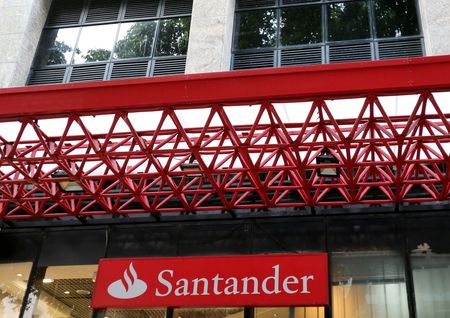By Jesús Aguado
MADRID (Reuters) -Santander’s executive chair Ana Botin warned on Tuesday against overregulation of Europe’s banking sector, saying it would hurt economic growth, and urged European governments to allow companies to invest and be more innovative.
Governments in Europe are debating whether to follow the Trump administration’s efforts to roll back rules put in place after the 2008 global financial crisis, with some arguing that the regulatory burden is actually holding back investment, spending and ultimately economic growth.
“Regulation kills innovation … We need to understand that unless we allow companies to innovate, we are not going to grow,” Botin told the International Banking Conference in Madrid.
“A lack of growth could be a problem for financial stability,” Botin said.
Nadia Calvino, head of the European Investment Bank (EIB), told the conference that “deregulation” was not on Brussels’ agenda.
Botin said that without growth, without profits, banks could not grow capital, highlighting the higher tax burden European lenders faced compared to their U.S. peers.
She also said that U.S. banks faced looser solvency requirements with the gap between Europe and the U.S. expected to widen by 3.5 trillion euros ($4.08 trillion) over the next three years, allowing them to better support lending to households and companies.
“At some point more capital is not going to save anybody,” Botin said.
Her comments contrast with calls last month from some top European central bankers to avoid the temptation of easing bank regulation.
ECB policymaker Jose Luis Escriva said that financial security must be maintained as new technology such as the issuance of stablecoins alter the market.
“At the end of the day, one moves to stablecoins that are completely reserve assets like treasury bills. If there was a crisis, and again, when there is a crisis, who is providing the ultimate liquidity in money? The central bank, the central bank is the one which is the lender of last resort because it has the possibility of issuing money,” he said.
($1 = 0.8575 euros)
(Reporting by Jesús Aguado; Additional reporting by Emma Pinedo; Editing by David Latona and Susan Fenton)












